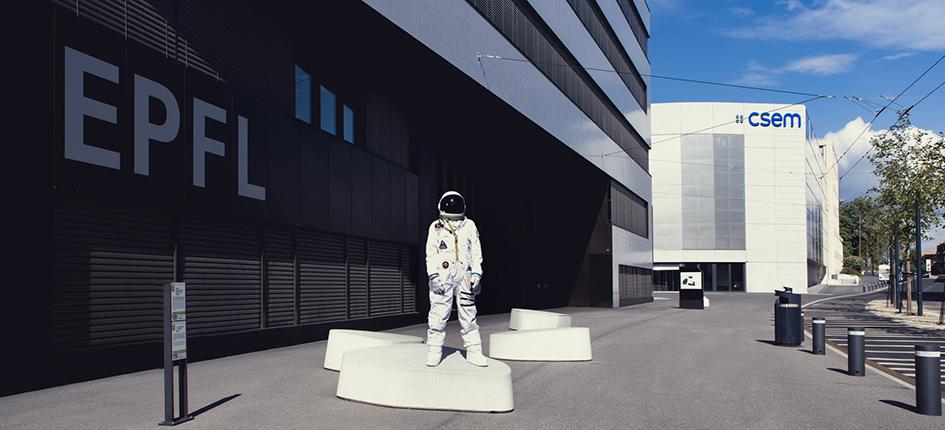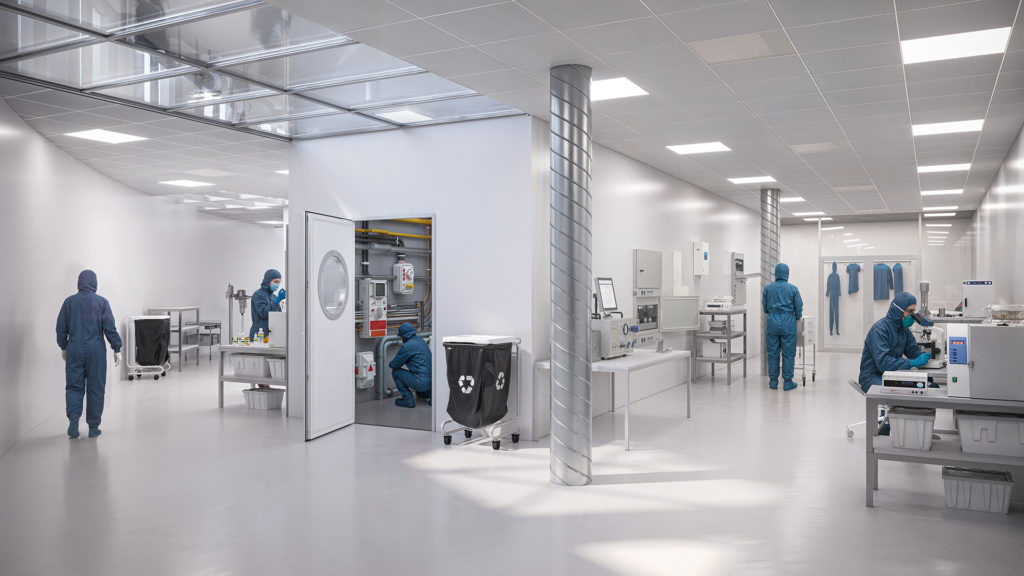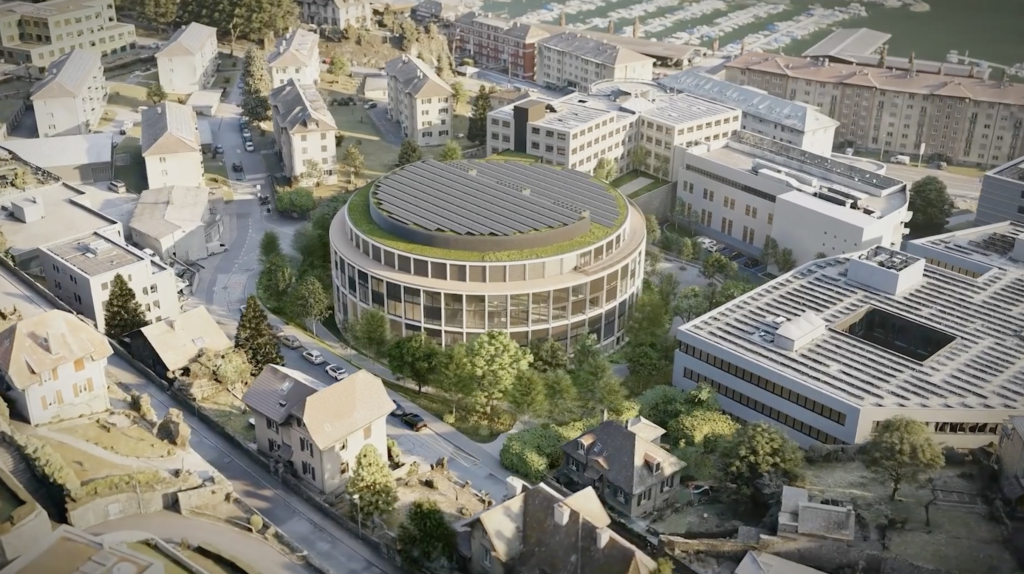A catalyst for innovation at the heart of an exceptional ecosystem
At the crossroads of research, industry, and education, JD7 is strategically located in one of Switzerland’s most technology-intensive regions. Based in Neuchâtel, this nationally significant project is part of a long-term initiative to structure an applied innovation ecosystem in synergy with leading scientific, academic, industrial, and economic actors. JD7 carries within its DNA the expertise and industrial culture of the small and ultra-small scale, at the heart of one of Switzerland’s historic strongholds for watchmaking and microtechnology.
Conceived as a dynamic and adaptable working environment, JD7 targets companies operating in micro- and nanotechnologies, high-precision manufacturing, renewable energy and digital technologies. It offers a rare combination of high-end technical infrastructure, an active collaborative ecosystem, and direct connectivity to the region’s key centers of expertise.
A Concrete and Complementary Innovation Ecosystem

One of JD7’s major assets is its ability to integrate into a structured, interconnected structured and interconnected innovation ecosystemwhich brings together all the resources needed for technological transformation. This ecosystem, articulated around MicrocityNeuchâtel’s innovation cluster, brings together leading academic, scientific and industrial players, as well as start-ups, technology SMEs and know-how transfer platforms. Microcity acts as a catalyst for synergiesMicrocity acts as a catalyst for synergies, facilitating exchanges between the worlds of research, education and business, and providing a framework conducive to the development of high value-added collaborative projects.
Within this dynamic ecosystem, several institutions play a key and complementary role across the entire innovation chain, including:
CSEM – High-impact technological transformation
The Swiss Center for Electronics and Microtechnology (CSEM) is one of Europe’s most advanced applied research institutes. Its expertise spans embedded artificial intelligence, microfabrication, autonomous systems and energy technologies. A true accelerator of innovation, CSEM supports companies in the development of differentiating technologies, ready for industrial deployment.
EPFL Neuchâtel – Applied scientific excellence
The Neuchâtel campus of the Swiss Federal Institute of Technology Lausanne (EPFL) has been developing advanced expertise for over three decades in photovoltaics, microengineering, MEMS, metrology and precision engineering. As a critical bridge between fundamental research and industrial application, EPFL Neuchâtel is strongly oriented toward technology transfer. Its integration within the regional economy enhances its ability to co-develop tangible solutions in direct collaboration with industry.
HE-Arc Engineering – Training future talent and driving collaboration
The Haute École Arc Engineering (HE-Arc) trains future engineers through programs closely aligned with industry needs. It encourages interdisciplinary projects and practical learning, particularly through direct collaborations with companies. Its graduates provide critical skills to the region’s strategic industries, while its faculty actively contributes to high-value applied research projects.
University of Neuchâtel – Innovation, Strategy and Society
The University of Neuchâtel, particularly through its Chair in Innovation Management, adds a strategic and analytical dimension to the ecosystem. Its research explores innovation governance, inter-organizational collaboration models, and the broader societal impact of technological innovation. This contribution is essential for embedding projects in a long-term, human-centered and responsible innovation framework.
An ISO5 Cleanroom designed for industrial performance
At the heart of the JD7 building lies a certified ISO 5 cleanroom, a strategic asset for companies working in ultra-clean environments. It provides optimal manufacturing and assembly conditions for sensitive components, particularly in micro- and nanotechnology, advanced sensors, medical devices and photonics.

Designed in accordance with international standards, the JD7 cleanroom combines technical precision, scalability and ergonomic design. It is part of a comprehensive service approach aimed at offering companies a fully operational environment from day one.
🔬
ISO 5 Environment – Certified Ultra-Clean Processes
The JD7 cleanroom is being designed to meet the requirements of ISO 14644-1 Class 5 (equivalent to Class 100 under the former US FED STD 209E), ensuring a maximum concentration of 100 particles ≥ 0.5 μm per cubic foot of air.
This level of performance will enable operations under ultra-clean conditions, supporting high process stability, reduced defect rates, and full compliance with international standards for advanced manufacturing—particularly in the fields of micro- and nanotechnology.
🧤
White & Grey Zones – Optimized contamination control
The facility is structured with clear white (production) and grey (logistics/preparation) zones. This zoning optimizes workflow and minimizes contamination risk, supporting the integrity of sensitive manufacturing environments.
📦
Underfloor Technical Zone – Streamlined maintenance
All technical equipment (networks, HVAC, monitoring systems) is housed in a dedicated underfloor technical zone, accessible without disrupting operations. This configuration maximizes responsiveness for interventions and allows the environment to be quickly adapted to new process requirements.
⚡
Plug & Play – Ready, modular and scalable
The cleanroom is delivered fully operational, with all utilities, systems and support services in place. It is designed to evolve with tenant needs—whether increasing capacity, reorganizing workflows, or adding production lines. Its modular architecture meets the demands of both pilot projects and pre-industrial production phases.
🛠️
Integrated technical management – Services from day one
JD7 provides comprehensive technical management, including environmental monitoring, security, preventive maintenance, air treatment, access control, and quality documentation. This turnkey model enables companies to concentrate on their core operations without diverting internal resources to facility management.
🧪
Centralized Distribution – Secure fluid and gas supply networks
A centralized system supplies gases, chemicals, and technical fluids in accordance with SEVESO and REACH standards. This setup ensures safety, reliability, and ease of maintenance, while enabling seamless upgrades and configuration changes.
Local foundations, global reach
Through its location, institutional partnerships and technical capabilities, JD7 strengthens Neuchâtel’s position as a reference center for advanced industrial innovation and contributes to reinforcing Switzerland’s technological sovereignty. The project is designed to support high-value-added sectors, promote interdisciplinary collaboration, and provide companies with the right conditions to innovate, produce and grow.
🗓️ Spaces will be available starting in Fall 2027.
📩 Interested companies are invited to explore the project and contact the JD7 team to learn more about partnership and installation opportunities.

